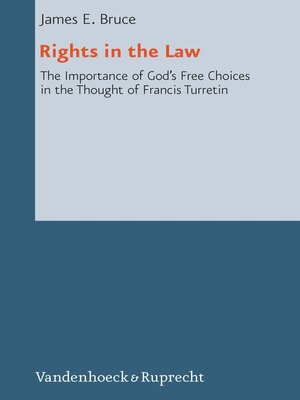Rights in the Law
ebook ∣ The Importance of God's Free Choices in the Thought of Francis Turretin · Reformed Historical Theology
By James E. Bruce

Sign up to save your library
With an OverDrive account, you can save your favorite libraries for at-a-glance information about availability. Find out more about OverDrive accounts.
Find this title in Libby, the library reading app by OverDrive.



Search for a digital library with this title
Title found at these libraries:
| Library Name | Distance |
|---|---|
| Loading... |
James E. Bruce explores the relationship between morality and God's free choices in the thought of Francis Turretin (1623–1687). The first book-length treatment of Turretin's natural law theory, Rights in the Law provides an important theological backdrop to Early Modern moral and political philosophy. Turretin affirms Thomas Aquinas's approach to the natural law, calling it the common opinion of the Reformed orthodox, but he develops it, too, by introducing a threefold scheme of right (ius)—divine, natural, and positive—to explain how change within the law is possible. For example, God can change the specific day for Sabbath observance from Saturday to Sunday—from positive right—without changing the natural law precept that finite creatures ought to rest. Yet even with respect to the natural law God is still free. God can make a world in which there is no such thing as murder: he can choose not to make a world that contains such a thing as man. What God cannot do is make a murderable man. So God's free choices determine the natural law insofar as the natural law is constituted by the nature of the things that God has chosen to create.







